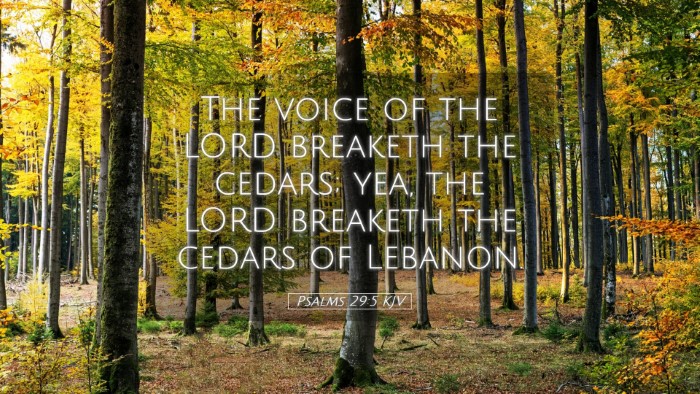Commentary on Psalms 29:5
Psalms 29:5: "The voice of the Lord breaketh the cedars; yea, the Lord breaketh the cedars of Lebanon."
Introduction
Psalms 29 is a majestic psalm ascribed to David, often recognized for its portrayal of the power and glory of God as manifest in nature. It calls upon the worshipers to recognize the supremacy of God's voice, exemplified in His ability to control even the mightiest elements of creation. This commentary will draw from notable public domain commentaries by Matthew Henry, Albert Barnes, and Adam Clarke to offer a comprehensive understanding of this particular verse, its theological implications, and its applications for believers today.
Exegesis of Psalms 29:5
Psalms 29:5 specifically highlights the destructive power of God's voice, illustrating it metaphorically through the imagery of cedars. The cedars of Lebanon were renowned for their strength and height, symbolizing luxury, stability, and durability. However, even these stalwart trees are no match for the voice of the Lord.
Matthew Henry's Perspective
Matthew Henry emphasizes the overwhelming and uncontested authority of God. He states that the voice of the Lord demonstrates His sovereignty and power over nature. Just as the cedars are known for their ability to withstand storms and endure time, God's voice can effortlessly break them, demonstrating that creation itself is subject to the Creator's command. Henry suggests that these images serve both to instill fear and to provide comfort to believers, reminding them of God's unparalleled strength.
Albert Barnes’ Insights
Albert Barnes provides a detailed exploration of the phrase "the voice of the Lord." He argues that this voice is not merely a sound but a powerful declaration that commands awe in creation. According to Barnes, the breaking of the cedars signifies the radical transformation that comes when God's authority is exercised. This verse serves to remind us of the transient nature of earthly power and strength compared to the everlasting dominion of God. For Barnes, the imagery also connects to events in the natural world, particularly storms where thunder can be likened to the voice of the Lord.
Adam Clarke’s Interpretation
Adam Clarke points out the historical and geographical significance of the cedars of Lebanon, often harvested for their valuable timber in ancient times. Clarke notes that these trees, known for their resilience, serve as a metaphor for the obstacles that might seem insurmountable in the believer’s life. The phrase indicates a divine ability to dismantle such challenges with mere words. Clarke further reinforces that the voice of God can uproot pride, ambition, and anything that opposes His will.
Theological Reflections
Theological interpretation of Psalms 29:5 encourages believers to reflect on the nature of God's voice in their lives. It signifies:
- God’s Sovereignty: The verse affirms that God is in ultimate control, and nothing exists beyond His reach. His command over creation encompasses both natural phenomena and human affairs.
- Paradox of Strength: The cedars represent strength and permanence; however, they are vulnerable to God’s command. This draws attention to the humility required in the face of divine authority.
- Call to Worship: Recognizing God's power invites believers to worship Him with reverence, acknowledging His might and glory in all facets of life.
Application for Pastors and Theologians
For pastors delivering sermons based on Psalms 29:5, the emphasis should be placed on God’s omnipotence and how it influences the believer's faith journey. It is a perfect text to instill hope and encouragement, especially in challenging times. Pastors may employ this scripture to discuss the nature of God’s communication with believers—inviting them to listen to His voice and to trust in His power.
Theologians may consider the implications of divine authority in their academic discussions, exploring how this verse contributes to the understanding of God's relationship with creation. They can frame it within the context of God's providence and sovereignty in the theological discourse on divine and human agency.
Conclusion
Psalms 29:5 serves as a profound reminder of the power of God's voice over creation. By breaking the cedars of Lebanon, God not only showcases His might but also challenges the believers to submit their challenges to Him. Drawing insights from the rich historical and theological commentary of past scholars, modern readers are encouraged to recognize the importance of God's voice in both their spiritual lives and the world around them.


